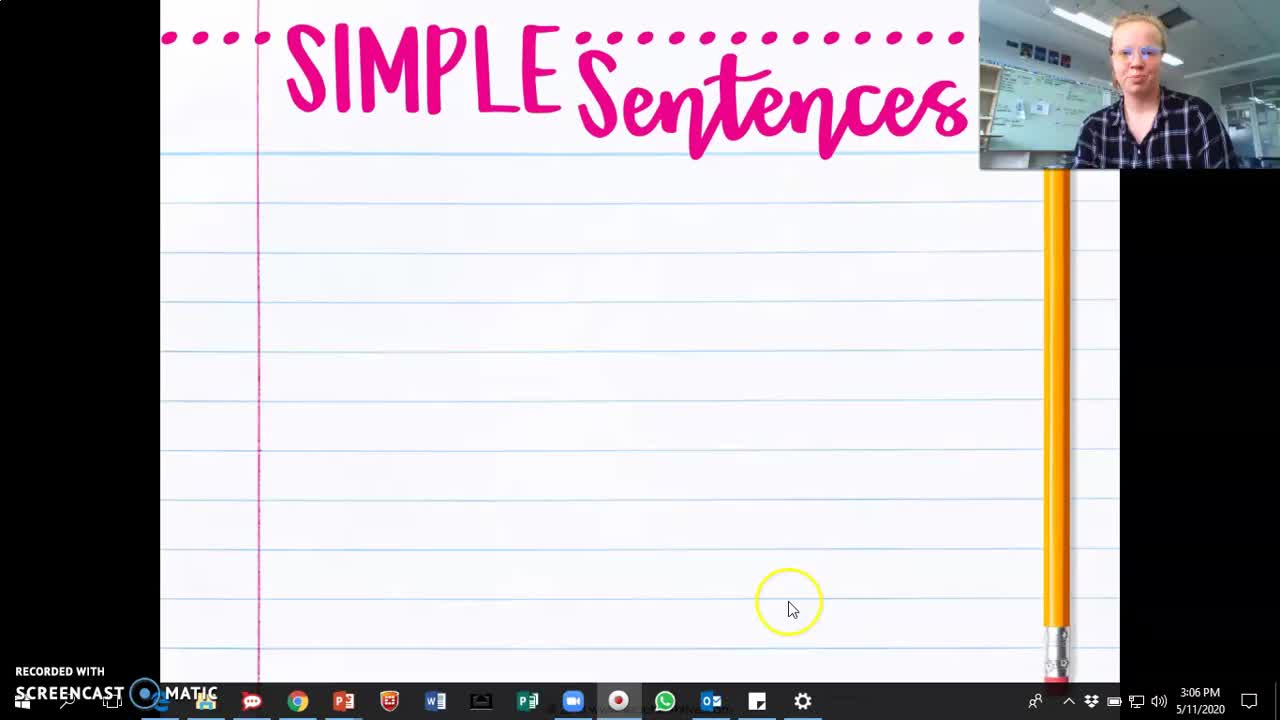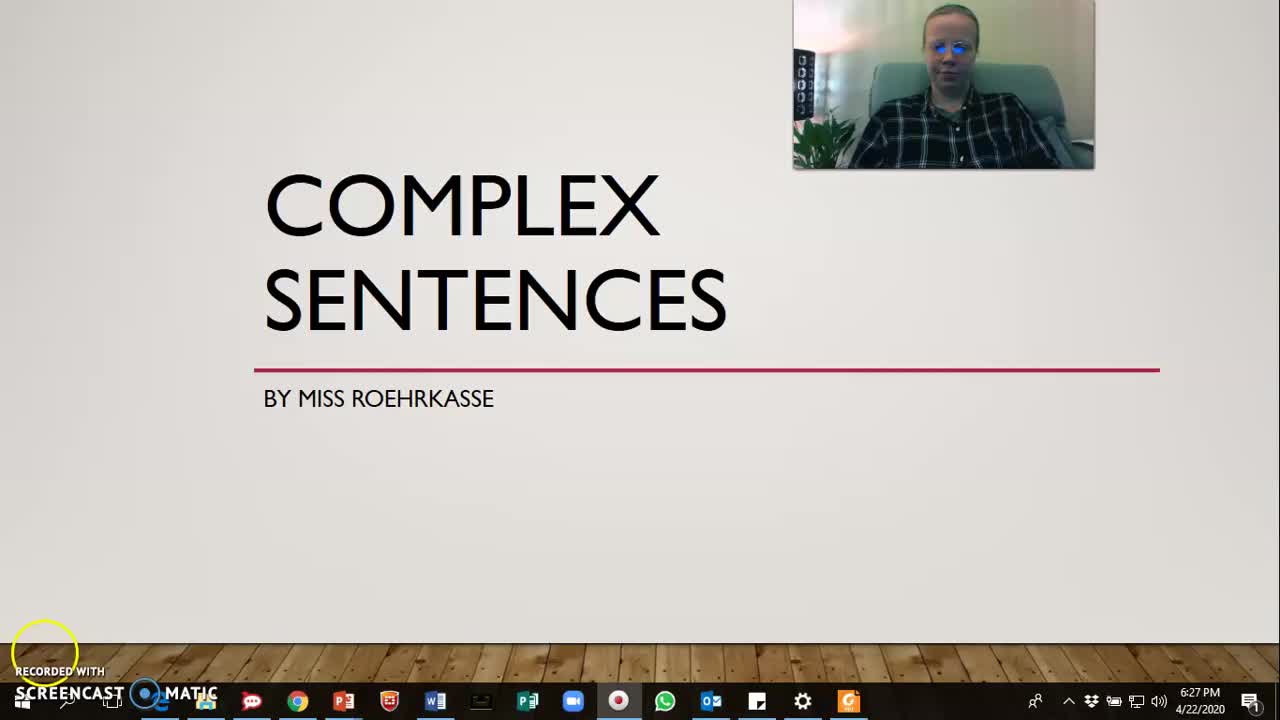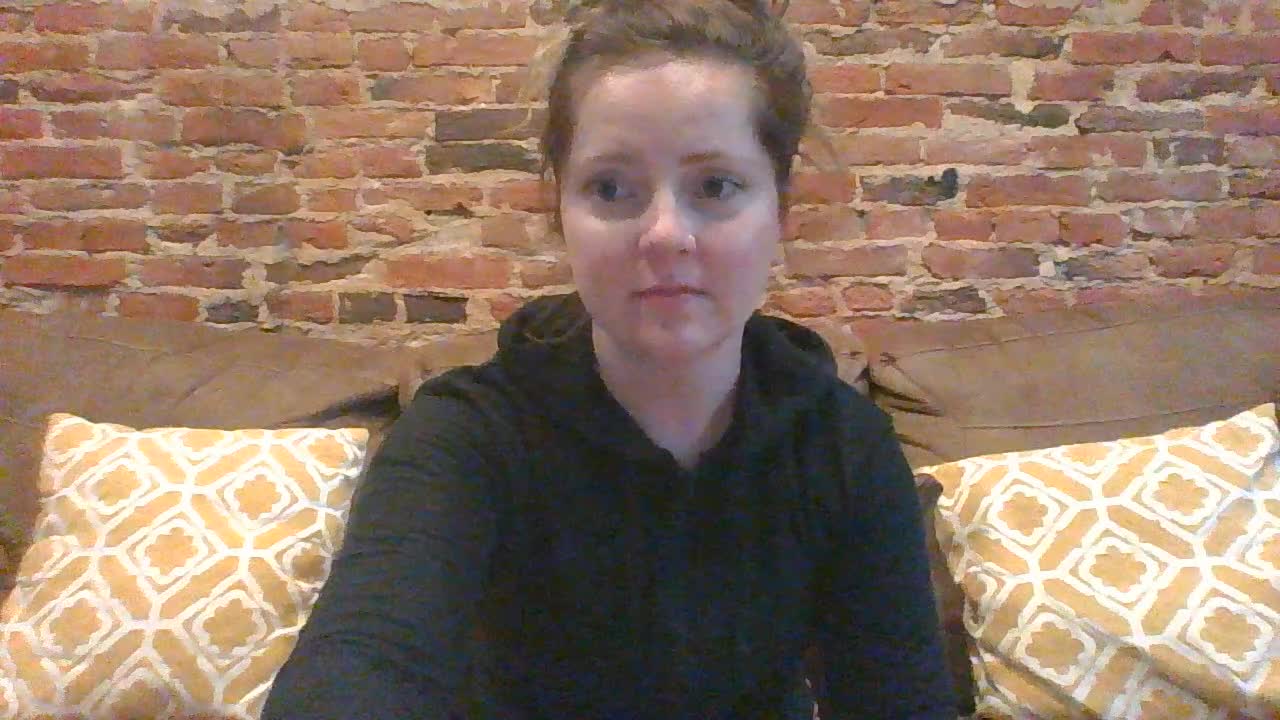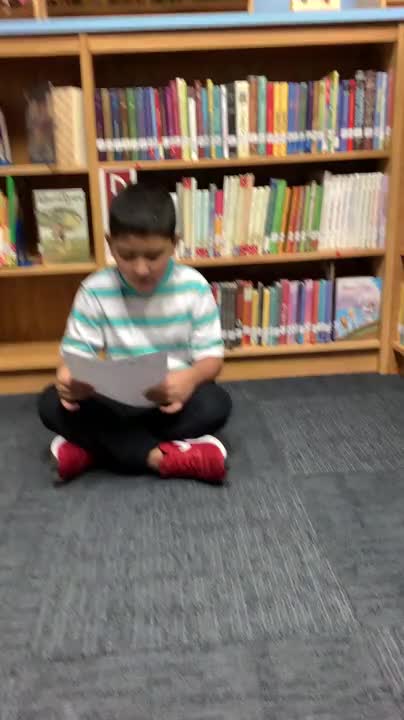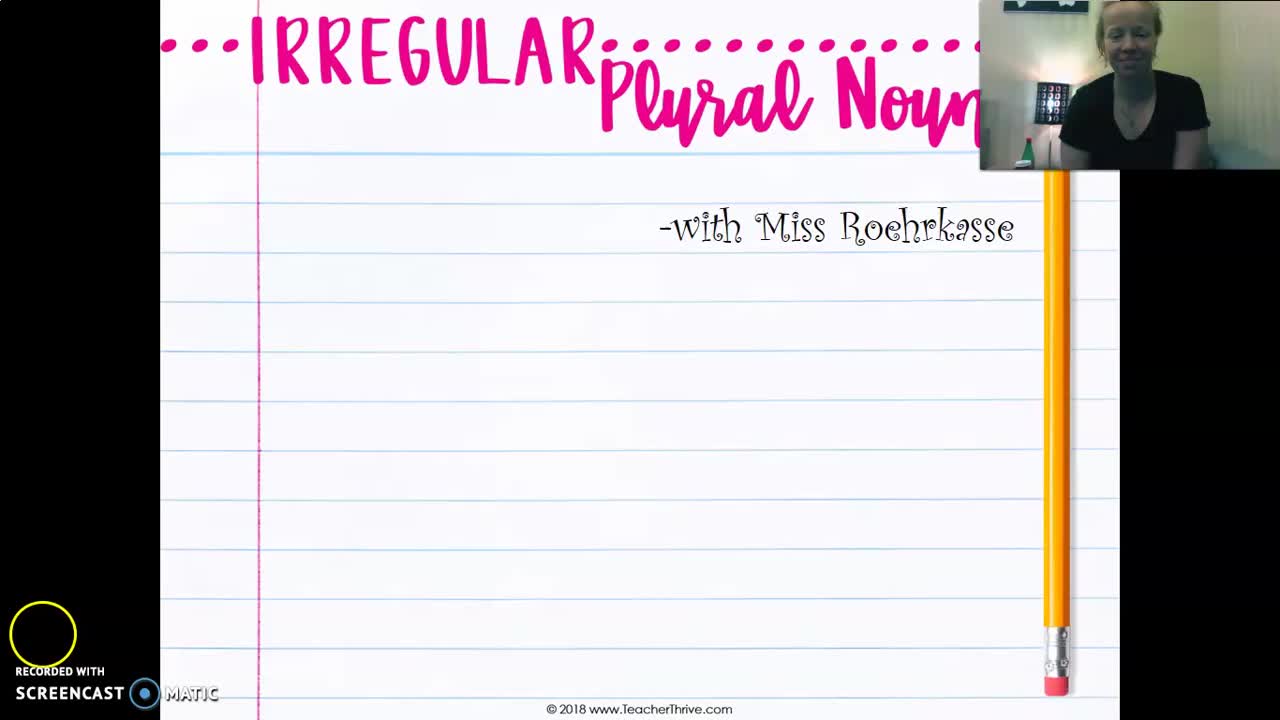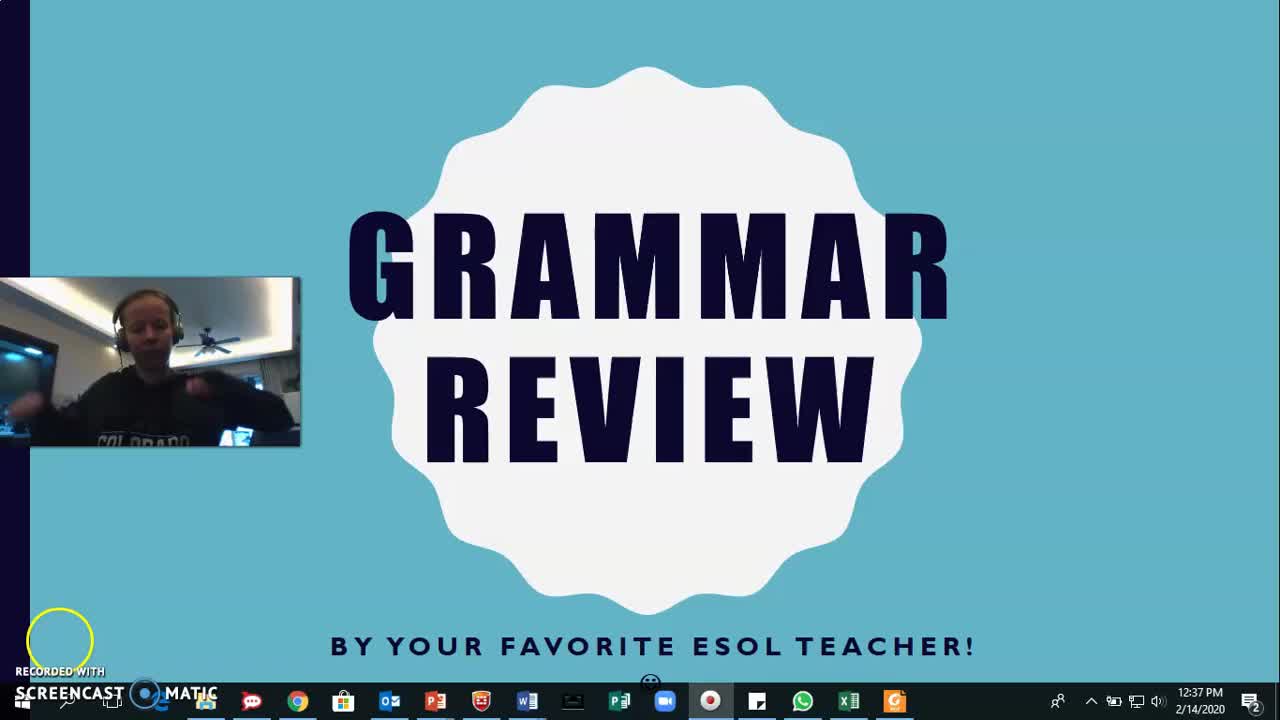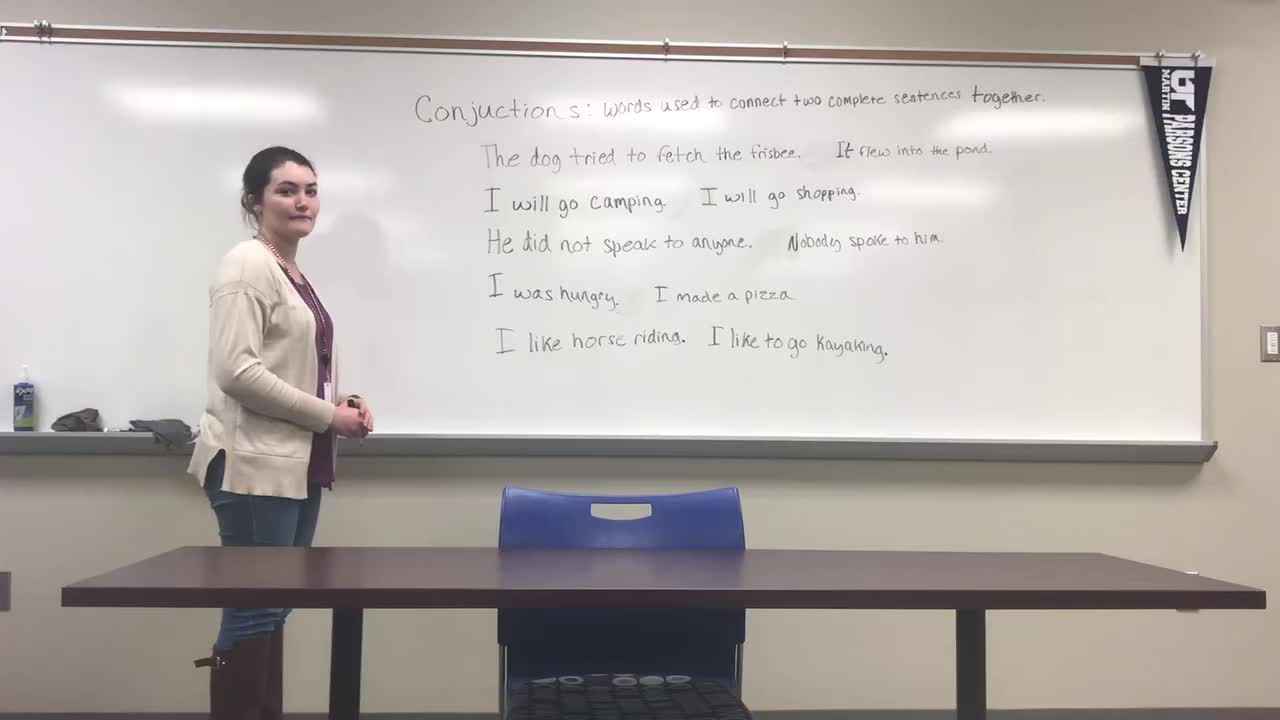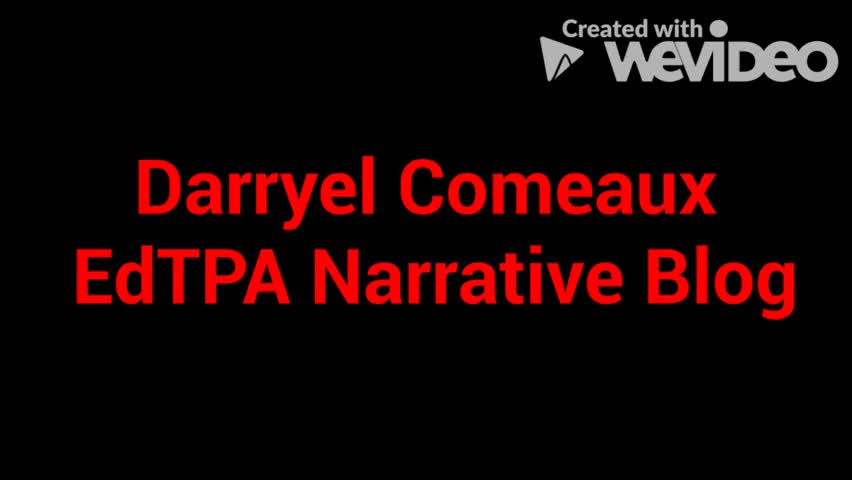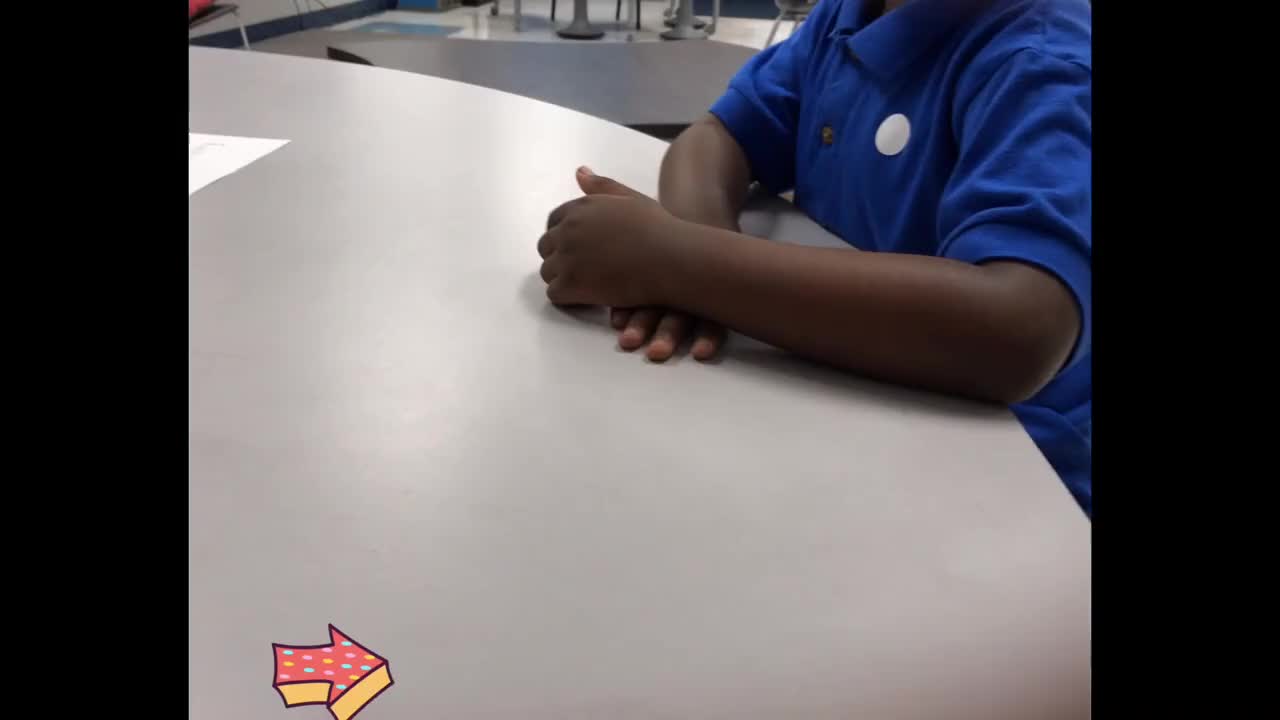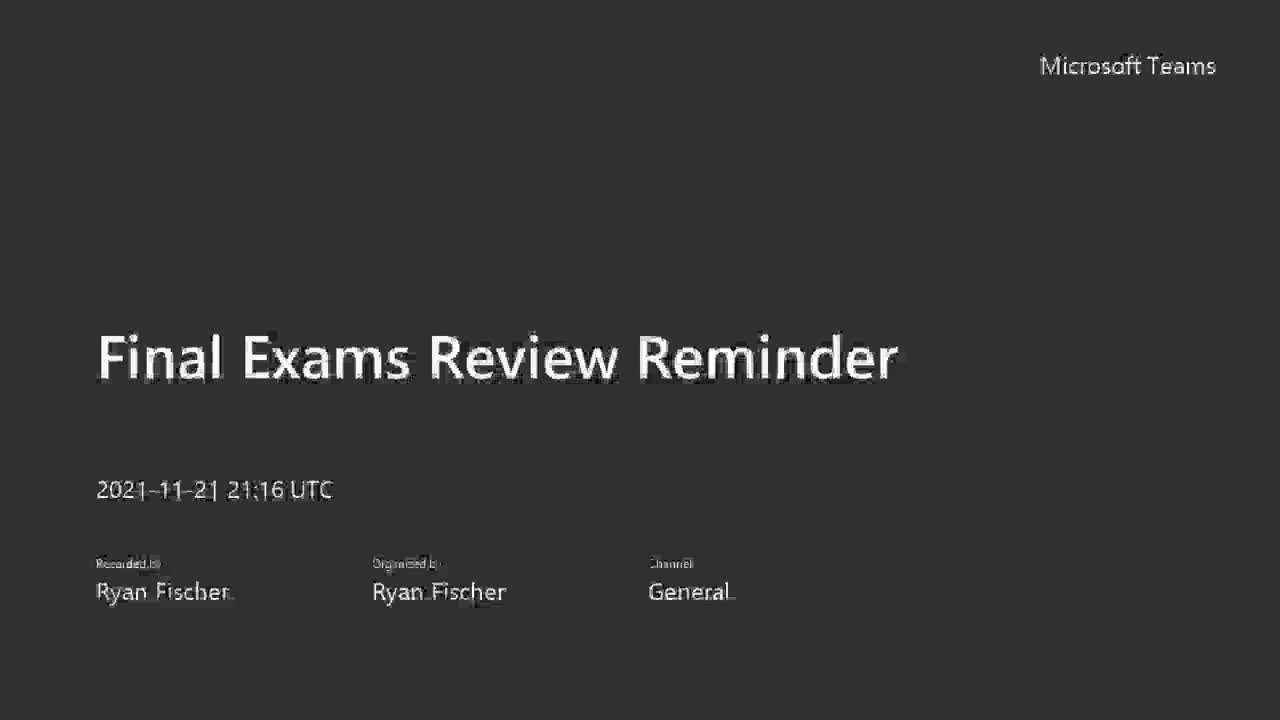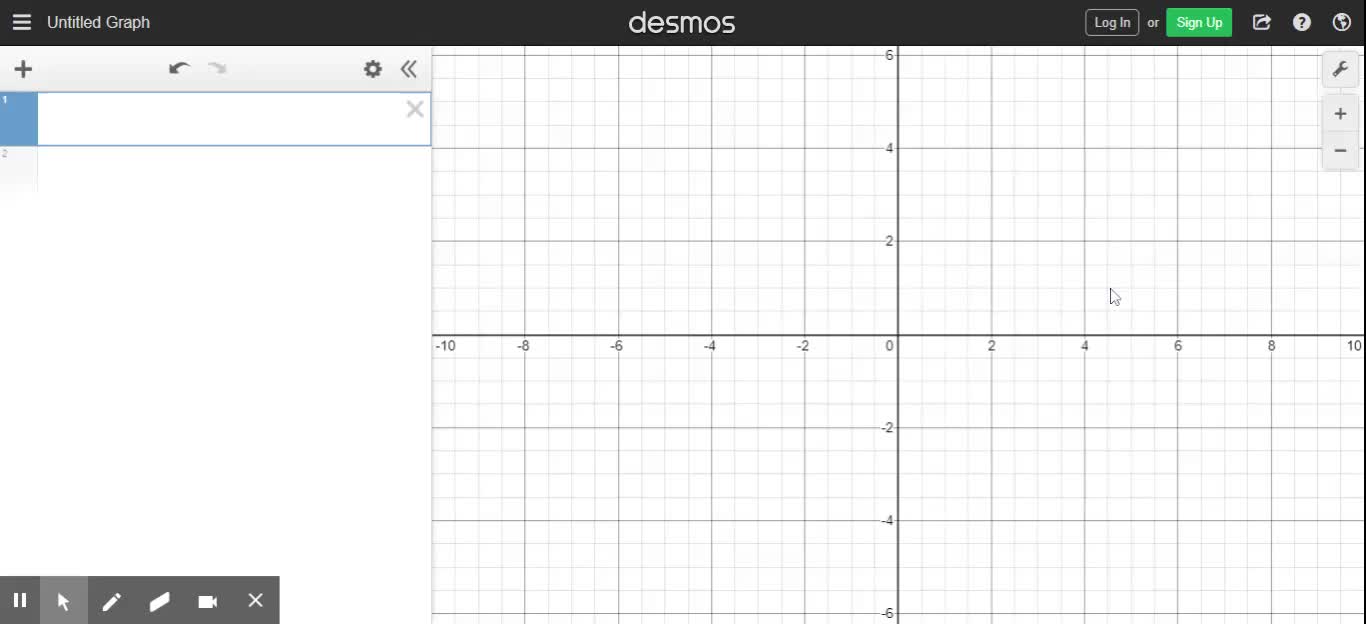Subject Verb Agreement
High School / Language Arts / English
Follow these rules to help you make sure that your subject and your verbs agrees.
It is pretty straightforward that the subject and the verb of your sentence should agree in number.
But sometimes it gets a little tricky.
Follow these rules to help you make sure that your subject and your verbs agrees.
First of all, what am I talking about when I say subject-verb agreement.
I mean the actor or the subject in your sentence agrees in number, being singular or plural, with the verb in your sentence.
This usually happens in the present tense, but sometimes, we have helping verbs that help determine whether the subject is singular or plural.
I?m pretty sure singular subjects gets plural verbs.
Plural subjects gets plural verbs.
But I?ll show you how to figure those out in a second.
Singular verbs in the present tense end in S. For example, ?The girl runS?and ?The boy climbS?.
Here are some ?Be?verbs that are singular. They get a little tricky because they don?t end in S. Am/Is/Was are singular like ?The girl is?, ?The boy was?, or ?I am?.
Plural verbs that are regular take the infinitive form of the verb. That means (no-s).
So if you are thinking of a verb ?to go, to run to jump?.
They take that infinitive form of the verb without an S.
So the girls run, The boys climb. No There is no S there.
?Be?verb in the plural tense also gets a little tricky. Are and were, depending on whether you are in the plural or past tense, again are a little bit different than the regular plural verbs. So the girls are. The boys were.
Here are some common verbs that you will see. Again, the Be verbs will show up in this chart because they are pretty important. But here are the singular and some plural forms of some common verbs.
Here?s a pronoun verb chart. So if you are using a pronoun as your subject, here?s the verb that you need to use.
Pay attention to I. It is singular but it doesn?t take the S. That is one of the weird quirks of the English language.
You, even if you are only referring to one person, is singular or plural but it always takes the plural verb no matter what.
We don?t distinguished in English between You singular and You plural the way you all might. He, she, it singular.
We, you, they are plural.
When you have a prepositional phrase that follows the subject, it does not affect the number of the subject of the sentence.
So if you have a singular subject followed by a prepositional phrase and the object of the preposition is plural, the object of the preposition does not, in any way, affect the number of that subject that is still singular.
I like to cross out the prepositional phrase after a subject and focus solely on the subject. So here?s an example: ?The school of students receives funding.?
The students is plural but that doesn?t matter because that is in the prepositional phrase of students.
Here we are just looking at school. School is singular. There is no S in school to make it plural. So it?s just straight school singular. And then our singular verb receives, gets S. Again, I like to cross-out ?of students?. It is very clear that our subject school is singular and the subject ?school? agrees in number with the singular verb ?receives?.
Here?s another example, the players on the team celebrates their victory.
I?ll cross-out ?on the team? so that I don?t get confused by team being singular. I see very clearly that players is plural so I need the plural verb ?celebrate? without the S.
This applies to subjects that are not pronouns. We get to the tricky part of pronouns in a little bit, but for right now, if you don?t have a pronoun, if you just have a noun, cross out that prepositional phrase after it.
Here?s a final example, ?The coach with the uniforms is who you need to see.? Cross out ?with the uniforms?. I can see that ?coach? is singular so I can use the singular Be-verb ?is?. Does it sound a little funny, at times, yes because you have a plural word right next to a singular verb or vice versa. But make sure you cross out that prepositional phrase. That will help you every time.
Compound subjects are subjects that are joined by coordinating conjunctions. Coordinating conjunctions are fanboys conjunctions and the ones we see more commonly are ?and? or ?or?. Sometimes, ?nor?.
Subjects joined by ?and? are always plural no matter what.
So even if you have two singular things that are joined by ?and?. ?And? combines them and makes them plural.
Joy and Marissa eat C lunch. Not Joy and Marissa eats C lunch.
Subjects joined by or/nor take the subject closest to the verb.
So what I like to do is cross out or/nor and everything that comes before it. So that I can clearly see what subject is closest to the verb.
Joy or Marissa eats C lunch. I?ll cross out ?Joy or?and left out Marissa. Marissa is singular so I take the singular verb ?eats?.
Here?s something that is a little bit trickier. So I?ll walk you through this one, as well. I see an Or so I?ll cross out OR and everything to the left of OR. I?m left with ?her brothers?as the subject that is closest to the left. ?Brothers?is plural, so I take the plural Be-verb ?Are?. Here are some indefinite pronouns that are always singular.
This gets a little tricky because we tend to think that everyone is plural. Everyone eats ?their? lunch.
But that is not the case. In fact, you can hear me say ?Everyone eats.? Because ONE is singular. It?s the same case with body. Everybody is singular.
So make sure you keep this list handy. You can screenshot this or do whatever you need to do.
Remember that these subjects are always singular and they take a singular verb.
Again, ?Everyone loves grammar?. S for that singular verb.
Someone IS loving grammar right now. ?Is? being the singular form of the Be verb.
So again, pay attention to the ONEs and the BODYs. Those are always singular.
These pronouns are always PLURAL so they are always going to take a plural verb.
Both the dogs eat their dinners.
Few of the people love dogs.
Again, ?eat? and ?love?, plural verbs in the present tense.
Here?s where it gets tricky. Some indefinite pronouns are either singular or plural. And it depends on the prepositional phrase that follows.
So I know I told you previously to cross out the prepositional phrase.
That is true when you have nouns. Or when you have indefinite pronouns that are always singular or always plural.
However, when you have an indefinite pronoun that can be either singular or plural, you have to use that prepositional phrase to figure out whether the pronoun is singular or plural. So I make a copy especially of this list right here and know that these words require that you keep the prepositional phrase after them.
?None of the students hate grammar.? I have to look at students to see that it?s plural so None become plural. Hate, then, is my plural verb.
?All of the cake taste delicious.? I look at my prepositional phrase and see that CAKE is singular making ALL singular. So I take the singular verb TASTES.
Again, I have to look at that prepositional phrase only for these indefinite pronouns. Any other words.
Any other pronouns does not matter. Only looking at the prepositional phrase and the object of the preposition with this list of words.
Here?s another quirky thing to pay attention to.
If a noun is countable, it?s plural. If it?s not countable, it?s singular. And here?s what I mean. None of the fields were ruined. Pretty straightforward. Fields ends in an S anyway so you?ll know that it?s plural. So that makes NONE plural and takes the plural verb ?were?.
But milk is kind of tricky because I?m not talking about milk gallons here in plastic containers. I?m just talking about milk in unknown quantity.
And if the milk is spilled, I can?t count individual droplets that?s a big puddle.
So milk would be singular here because it is not countable. It?s one quantity which is why it?s not countable.
So milk here is singular. All become singular. And the verb can take the singular form of Have which is Has.
Collective nouns are nouns that are made up of many things but they represent only One things.
So jury, class, flock, and family. Even if they are made up of multiple things, they represent one things and so they take singular verbs.
Notice that I didn?t say juries of classes. There is not that extra S or IES or ES in the end of them to make them plural. So they represent one thing.
Keep in mind that it doesn?t matter what comes after them. So the example of ?The family of four people goes on vacation.? FOUR PEOPLE clearly plural but as we talked about earlier, you can cross out OF FOUR PEOPLE because the prepositional phrase doesn?t matter when you have a noun like FAMILY.
You can cross out OF FOUR PEOPLE. I can see FAMILY singular so I use the singular form of GO which is GOES.
Existential subjects are words that start a sentence with words like There, Here or Where. You have to look after the verb to determine the subject. I like reverse the sentence to figure out who I?m talking about in a sentence.
There is the girl I?ve been waiting to see. I just got to flip the sentence around.The girl I?ve been waiting to see is there.
I clearly see that GIRL is singular, so I use the singular form of B which is IS.
Here?s another example, I already crossed it out for you.
Here are the people with the amazing house. If I flip it. The people with the amazing house are here.
Again, I cross out the prepositional phrases and I?m left with people which is plural, so I get the plural form of the B verb ARE.
Lots of rules to apply here. But if you take them one at a time. You?ll be in great shape.
But sometimes it gets a little tricky.
Follow these rules to help you make sure that your subject and your verbs agrees.
First of all, what am I talking about when I say subject-verb agreement.
I mean the actor or the subject in your sentence agrees in number, being singular or plural, with the verb in your sentence.
This usually happens in the present tense, but sometimes, we have helping verbs that help determine whether the subject is singular or plural.
I?m pretty sure singular subjects gets plural verbs.
Plural subjects gets plural verbs.
But I?ll show you how to figure those out in a second.
Singular verbs in the present tense end in S. For example, ?The girl runS?and ?The boy climbS?.
Here are some ?Be?verbs that are singular. They get a little tricky because they don?t end in S. Am/Is/Was are singular like ?The girl is?, ?The boy was?, or ?I am?.
Plural verbs that are regular take the infinitive form of the verb. That means (no-s).
So if you are thinking of a verb ?to go, to run to jump?.
They take that infinitive form of the verb without an S.
So the girls run, The boys climb. No There is no S there.
?Be?verb in the plural tense also gets a little tricky. Are and were, depending on whether you are in the plural or past tense, again are a little bit different than the regular plural verbs. So the girls are. The boys were.
Here are some common verbs that you will see. Again, the Be verbs will show up in this chart because they are pretty important. But here are the singular and some plural forms of some common verbs.
Here?s a pronoun verb chart. So if you are using a pronoun as your subject, here?s the verb that you need to use.
Pay attention to I. It is singular but it doesn?t take the S. That is one of the weird quirks of the English language.
You, even if you are only referring to one person, is singular or plural but it always takes the plural verb no matter what.
We don?t distinguished in English between You singular and You plural the way you all might. He, she, it singular.
We, you, they are plural.
When you have a prepositional phrase that follows the subject, it does not affect the number of the subject of the sentence.
So if you have a singular subject followed by a prepositional phrase and the object of the preposition is plural, the object of the preposition does not, in any way, affect the number of that subject that is still singular.
I like to cross out the prepositional phrase after a subject and focus solely on the subject. So here?s an example: ?The school of students receives funding.?
The students is plural but that doesn?t matter because that is in the prepositional phrase of students.
Here we are just looking at school. School is singular. There is no S in school to make it plural. So it?s just straight school singular. And then our singular verb receives, gets S. Again, I like to cross-out ?of students?. It is very clear that our subject school is singular and the subject ?school? agrees in number with the singular verb ?receives?.
Here?s another example, the players on the team celebrates their victory.
I?ll cross-out ?on the team? so that I don?t get confused by team being singular. I see very clearly that players is plural so I need the plural verb ?celebrate? without the S.
This applies to subjects that are not pronouns. We get to the tricky part of pronouns in a little bit, but for right now, if you don?t have a pronoun, if you just have a noun, cross out that prepositional phrase after it.
Here?s a final example, ?The coach with the uniforms is who you need to see.? Cross out ?with the uniforms?. I can see that ?coach? is singular so I can use the singular Be-verb ?is?. Does it sound a little funny, at times, yes because you have a plural word right next to a singular verb or vice versa. But make sure you cross out that prepositional phrase. That will help you every time.
Compound subjects are subjects that are joined by coordinating conjunctions. Coordinating conjunctions are fanboys conjunctions and the ones we see more commonly are ?and? or ?or?. Sometimes, ?nor?.
Subjects joined by ?and? are always plural no matter what.
So even if you have two singular things that are joined by ?and?. ?And? combines them and makes them plural.
Joy and Marissa eat C lunch. Not Joy and Marissa eats C lunch.
Subjects joined by or/nor take the subject closest to the verb.
So what I like to do is cross out or/nor and everything that comes before it. So that I can clearly see what subject is closest to the verb.
Joy or Marissa eats C lunch. I?ll cross out ?Joy or?and left out Marissa. Marissa is singular so I take the singular verb ?eats?.
Here?s something that is a little bit trickier. So I?ll walk you through this one, as well. I see an Or so I?ll cross out OR and everything to the left of OR. I?m left with ?her brothers?as the subject that is closest to the left. ?Brothers?is plural, so I take the plural Be-verb ?Are?. Here are some indefinite pronouns that are always singular.
This gets a little tricky because we tend to think that everyone is plural. Everyone eats ?their? lunch.
But that is not the case. In fact, you can hear me say ?Everyone eats.? Because ONE is singular. It?s the same case with body. Everybody is singular.
So make sure you keep this list handy. You can screenshot this or do whatever you need to do.
Remember that these subjects are always singular and they take a singular verb.
Again, ?Everyone loves grammar?. S for that singular verb.
Someone IS loving grammar right now. ?Is? being the singular form of the Be verb.
So again, pay attention to the ONEs and the BODYs. Those are always singular.
These pronouns are always PLURAL so they are always going to take a plural verb.
Both the dogs eat their dinners.
Few of the people love dogs.
Again, ?eat? and ?love?, plural verbs in the present tense.
Here?s where it gets tricky. Some indefinite pronouns are either singular or plural. And it depends on the prepositional phrase that follows.
So I know I told you previously to cross out the prepositional phrase.
That is true when you have nouns. Or when you have indefinite pronouns that are always singular or always plural.
However, when you have an indefinite pronoun that can be either singular or plural, you have to use that prepositional phrase to figure out whether the pronoun is singular or plural. So I make a copy especially of this list right here and know that these words require that you keep the prepositional phrase after them.
?None of the students hate grammar.? I have to look at students to see that it?s plural so None become plural. Hate, then, is my plural verb.
?All of the cake taste delicious.? I look at my prepositional phrase and see that CAKE is singular making ALL singular. So I take the singular verb TASTES.
Again, I have to look at that prepositional phrase only for these indefinite pronouns. Any other words.
Any other pronouns does not matter. Only looking at the prepositional phrase and the object of the preposition with this list of words.
Here?s another quirky thing to pay attention to.
If a noun is countable, it?s plural. If it?s not countable, it?s singular. And here?s what I mean. None of the fields were ruined. Pretty straightforward. Fields ends in an S anyway so you?ll know that it?s plural. So that makes NONE plural and takes the plural verb ?were?.
But milk is kind of tricky because I?m not talking about milk gallons here in plastic containers. I?m just talking about milk in unknown quantity.
And if the milk is spilled, I can?t count individual droplets that?s a big puddle.
So milk would be singular here because it is not countable. It?s one quantity which is why it?s not countable.
So milk here is singular. All become singular. And the verb can take the singular form of Have which is Has.
Collective nouns are nouns that are made up of many things but they represent only One things.
So jury, class, flock, and family. Even if they are made up of multiple things, they represent one things and so they take singular verbs.
Notice that I didn?t say juries of classes. There is not that extra S or IES or ES in the end of them to make them plural. So they represent one thing.
Keep in mind that it doesn?t matter what comes after them. So the example of ?The family of four people goes on vacation.? FOUR PEOPLE clearly plural but as we talked about earlier, you can cross out OF FOUR PEOPLE because the prepositional phrase doesn?t matter when you have a noun like FAMILY.
You can cross out OF FOUR PEOPLE. I can see FAMILY singular so I use the singular form of GO which is GOES.
Existential subjects are words that start a sentence with words like There, Here or Where. You have to look after the verb to determine the subject. I like reverse the sentence to figure out who I?m talking about in a sentence.
There is the girl I?ve been waiting to see. I just got to flip the sentence around.The girl I?ve been waiting to see is there.
I clearly see that GIRL is singular, so I use the singular form of B which is IS.
Here?s another example, I already crossed it out for you.
Here are the people with the amazing house. If I flip it. The people with the amazing house are here.
Again, I cross out the prepositional phrases and I?m left with people which is plural, so I get the plural form of the B verb ARE.
Lots of rules to apply here. But if you take them one at a time. You?ll be in great shape.

